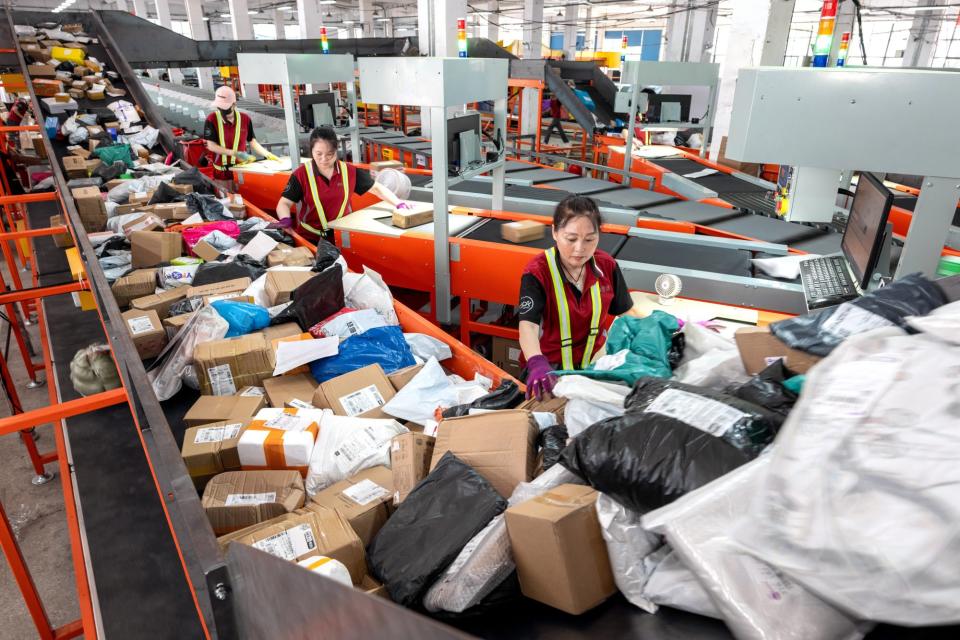Chinese e-commerce sales up 14% during 618 shopping festival, report says
China's major e-commerce platforms saw gross merchandise value (GMV) grow 13.6 per cent year on year during the 618 shopping festival, according to third-party data, although profit margins are likely to be squeezed amid a heated price war.
The estimated GMV growth, published in a report from research firm Analysys on Thursday, includes sales on China's biggest online shopping platforms: Alibaba Group Holding's Taobao and Tmall, JD.com, Pinduoduo, ByteDance's Douyin and rival short-video platform Kuaishou.
Newer challengers in the e-commerce arena appear to have greater momentum than Alibaba and JD.com, the two long-standing players in the domestic market. Alibaba owns the South China Morning Post.
Do you have questions about the biggest topics and trends from around the world? Get the answers with SCMP Knowledge, our new platform of curated content with explainers, FAQs, analyses and infographics brought to you by our award-winning team.
Douyin, the Chinese version of TikTok, led all other platforms with a 26.2 per cent surge in GMV, followed by Pinduoduo's 17.7 per cent and Kuaishou's 16.1 per cent. Alibaba and JD.com saw GMV grow 12 per cent and 5.7 per cent, respectively, according to Analysys.

Workers sort parcels at an express logistics company in Huzhou, eastern Zhejiang province, on June 18, 2024. Photo: Xinhua alt=Workers sort parcels at an express logistics company in Huzhou, eastern Zhejiang province, on June 18, 2024. Photo: Xinhua>
The companies have largely stopped publishing their own GMV figures for big shopping festivals, including for this year's 618 event. However, the Analysys figures align with the growth narrative from the limited figures that firms did release this year.
JD.com said on Wednesday that transaction volume and orders during the midyear sales extravaganza broke records, without disclosing the exact figures.
Taobao and Tmall's GMV also recorded a new high during the campaign period through June 18, according to people familiar with the matter.
"The gap between online growth and total growth in retail sales has gradually widened, indicating that the driving force of online consumption is significantly stronger than offline consumption," Analysys said in the report.
"While there isn't an obvious consumption downgrade trend this year, consumers are generally more rational in their spending patterns," said Joyce Ju, vice-president of Greater China Internet Research at BofA Securities.
Ju noted that some categories, such as clothing and home appliances, have shown weaker online sales, while segments like online food delivery remain more resilient.
Despite the GMV growth, many merchants have complained that profits are declining owing to a brutal price war that has emerged as platforms compete to attract price-conscious consumers in a slowing economy.
Zuoliang - a domestic brand that sells bird's nest soup, a Chinese cuisine, on JD.com - said in a social media post on Thursday that it was "forced to sell at a price that is even lower than our cost" during the 618 event, creating an "unprecedented dilemma".
Other brands have also complained publicly about taking a loss on their goods, including apparel and appliances.

A live-streamer sells products online from Longquan Township in southwestern Guizhou province on June 18, 2024. Photo: Xinhua alt=A live-streamer sells products online from Longquan Township in southwestern Guizhou province on June 18, 2024. Photo: Xinhua>
Merchants have been trying to adopt a more rational sales approach this 618 season, but platform operators have become more aggressive in providing consumers with cash subsidies and discounts, according to BofA's Ju.
"E-commerce platforms are placing greater emphasis on price competitiveness than ever before, aiming to protect and regain market share amid intensifying competition in the sector," Ju said.
Pinduoduo reportedly introduced an "automated price-tracking system" for merchants to swiftly adjust prices online during the 618 event. Douyin has also been testing a smart pricing system for merchants, according to recent Chinese media reports.
During the event, the delivery rate of e-commerce parcels grew 23 per cent year on year, outpacing GMV growth, mainly due to higher return rates and a potential year-on-year decline in value per order, reflecting more conservative consumer behaviour, according to a research note from HSBC on Thursday.
Jessie Li, a 30-year-old based in Shanghai, said she had spent nearly 4,000 yuan during the sales event this year. However, this year she chose to buy "obviously cheaper" brands that she would not have bought a few years ago. Many of these are domestic brands that offer similar quality at lower prices, she said.
"After my boss cut my quarterly bonus last year, I had no choice but to become much more price-sensitive," Li said.
This article originally appeared in the South China Morning Post (SCMP), the most authoritative voice reporting on China and Asia for more than a century. For more SCMP stories, please explore the SCMP app or visit the SCMP's Facebook and Twitter pages. Copyright © 2024 South China Morning Post Publishers Ltd. All rights reserved.
Copyright (c) 2024. South China Morning Post Publishers Ltd. All rights reserved.

 Yahoo Finance
Yahoo Finance 